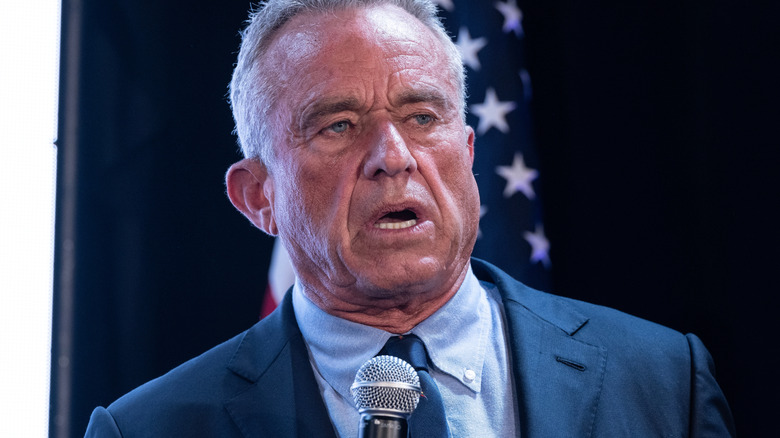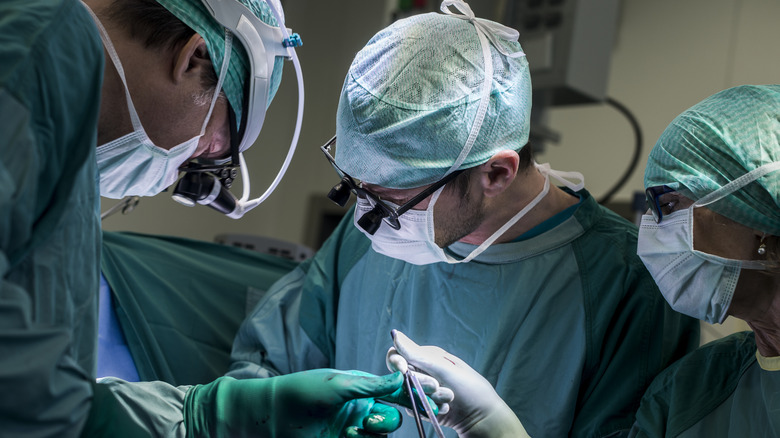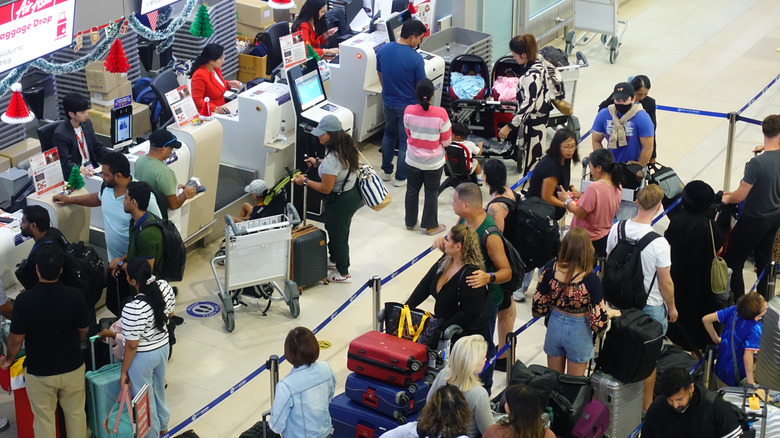The Medical Procedure RFK Jr. Underwent In Japan To Try And Fix His Quivering Voice
Robert F. Kennedy, Jr.'s voice frequently sounds strained and raspy because of a rare neurological condition called spasmodic dysphonia that only affects around 50,000 new adults yearly. (Actress Selma Blair has had spasmodic dysphonia as well.) And he's quite aware of how his spasmodic dysphonia affects how others hear him when he gives public talks. "I think it makes it problematical for people to listen to me," he noted in a 2023 town hall (via NewsNation).
Kennedy has taken steps to minimize the side effects of his voice disorder over the years, including Botox injections (per LA Times). However, he stopped the injections after a decade, concluding that they "were not a good fit." (You may want to know about Botox injections if you've considered trying them for any condition.) He also spoke about one of the potential remedies he tried in 2022, a surgical procedure that he ostensibly hoped would fix his quivering voice. The surgery, called type 2 thyroplasty, represented a cutting-edge way to improve his ability to speak.
Understanding type 2 thyroplasty
Nobuhiko Isshiki, a Japanese professor, introduced type 2 thyroplasty in the 1990s. The surgery is designed to address symptoms of adductor spasmodic dysphonia (Kennedy's diagnosis), a condition that causes the vocal cords to clamp shut at random intervals. People with adductor spasmodic dysphonia frequently find it difficult to be understood or to make audible sounds.
Type 2 thyroplasty aims to establish voice control by inserting a titanium bridge into the cartilage around the vocal cords. During surgery, the patient remains awake and recites words as the doctor positions the bridge. When the patient and doctor are satisfied with the positioning, the doctor completes the operation. Once placed, the bridge keeps the vocal cords from closing completely, allowing some air to move between the vocal folds to create sounds.
Many people who undergo the type 2 thyroplasty report feeling satisfied with their outcomes (per the Translational Research Center of Medical Innovation). However, the surgery comes with minor and more serious risks. As an example, a piece of the bridge may break, which can require more surgery to resolve the situation. Plus, not all doctors support invasive means to combat the symptoms of spasmodic dysphonia. Otolaryngology expert Dr. Michael M. Johns told the Washington Post that the surgical options for spasmodic dysphonia are "fraught with complications" and not "standard" ways to treat the problem.
Traveling overseas for new medical treatments
After type 2 thyroplasty, Kennedy's voice has remained somewhat unchanged. Nonetheless, he has maintained a positive attitude since undergoing surgery. In a 2023 video interview, he noted that he was progressing well and had moved into other treatments, including chiropractic care.
Kennedy's journey for a solution to his medical problem took him halfway around the world because the type 2 thyroplasty procedure wasn't approved or available in the United States. In fact, type 2 thyroplasty still isn't as of 2025, although Dysphonia International indicates that the process to receive U.S. approval is in motion.
Kennedy's decision to go outside of the U.S. for medical treatments isn't unique. According to the U.S. Department of State, up to 320,000 American citizens travel abroad every year for "medical tourism" reasons. The agency recommends that individuals who seek care in other countries conduct intensive due diligence to ensure their safety and well-being.


